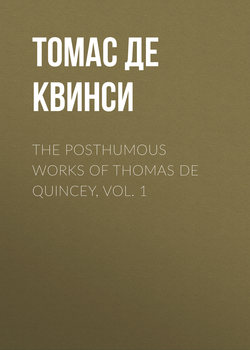Читать книгу The Posthumous Works of Thomas De Quincey, Vol. 1 - Томас Де Квинси - Страница 16
DE QUINCEY'S POSTHUMOUS WORKS
VIII. 'WHAT IS TRUTH?' THE JESTING PILATE SAID—A FALSE GLOSS
ОглавлениеIt is true that Pilate could not be expected fully to comprehend an idea which was yet new to man; Christ's words were beyond his depth. But, still, his natural light would guide him thus far—that, although he had never heard of any truth which rose to that distinction, still, if any one class of truth should in future come to eclipse all other classes of truth immeasurably, as regarded its practical results, as regarded some dark dependency of human interests, in that case it would certainly merit the distinctive name of 'The Truth.' The case in which such a distinction would become reasonable and available was one utterly unrealized to his experience, not even within the light of his conjectures as to its special conditions; but, still, as a general possibility it was conceivable to his understanding; though not comprehensible, yet apprehensible. And in going on to the next great question, to the inevitable question, 'What is the truth?' Pilate had no thought of jesting. Jesting was the last thing of which his impassioned mood in that great hour was capable. Roman magistrates of supreme rank were little disposed to jesting on the judgment-seat amongst a refractory and dangerous people; and of Pilate in particular, every word, every effort, every act, demonstrate that he was agitated with new instincts and misgivings of some shadowy revelation opening upon man, that his heart was convulsed with desponding anxiety in the first place to save the man who appeared the depositary of this revelation, but who, if, after all, only a sublime lunatic, was, at the very least, innocent of all offence. It must have struck all close observers of early Christianity how large a proportion of the new converts lay amongst Roman officers, or (to speak more adequately) amongst Romans of high rank, both men and women. And for that there was high reason. In the advance of civilization, and in the corresponding decay of idolatrous religions, there was fast arising a new growth of cravings amongst men. Mythological and desperately immoral religions, that spoke only to the blind sense of power, had been giving way through the three previous centuries to a fearful extent. They had receded from the higher natures of both Greece and Rome as the sea has locally receded from many shores of the earth. Such natures were left 'miserably bare'; the sense of dependency by any tie upon the invisible world, or at least upon the supernatural world, had decayed, and unless this painful void were filled up by some supplementary bond in the same direction, a condition of practical atheism must take place, such as could not but starve and impoverish in human nature those yearnings after the infinite which are the pledges of all internal grandeur. But this dependency could not be replaced by one of the same vicious nature. Into any new dependency a new element must be introduced. The sense of insufficiency would be renewed in triple strength if merely the old relations of weakness to power, of art to greater art, of intellect to higher intellect, of less to more within the same exact limits as to kind of excellence, should be rehearsed under new names or improved theogonies. Hitherto, no relation of man to divine or demoniac powers had included the least particle or fraction or hint of any moral element; nor was such an element possible in that dependency, for profound reasons.
